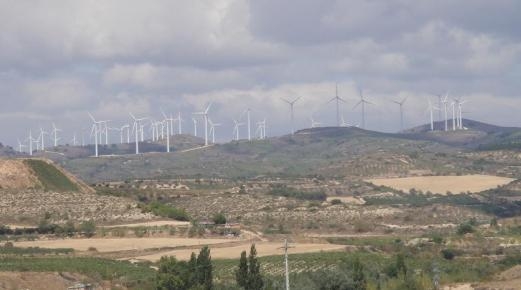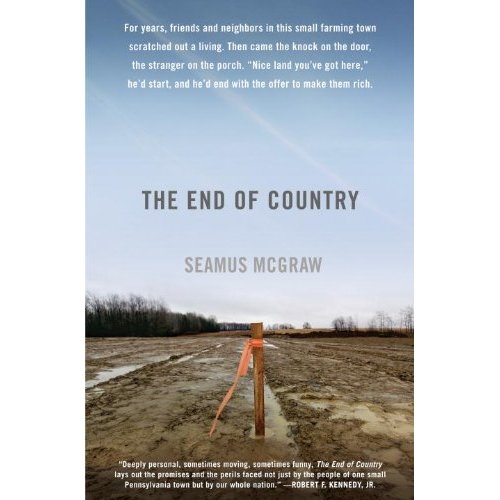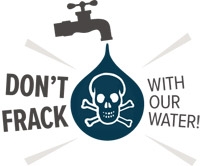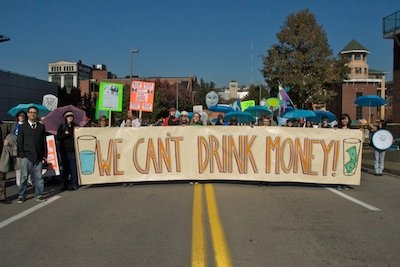Is anybody else scared about hydrofracking???
Jun 7, 2011 at 4:06am Edited
Why can't we do this. This is in northern Spain, where every vista across the entire country is filled with thousands of wind turbines. They are beautiful. I wish we could erect a few near the lookout at the reservation. They should be along the Hudson , on the Pallisades, at the shore. It should be easy.
It'd be easier (A) if wind turbines were manufactured here in the USA, ergo were cheaper, and (2) if "NIMBY" was only applied to truly detrimental stuff, like fracking...
-s.
-s.
Speaking of those turbines, and the whole "Green Technologies" deal, I overstated the USA's lack of manufacturers...
Here's another NYT story:
"June 8, 2011
U.S. Is Falling Behind in the Business of Green
By ELISABETH ROSENTHAL
LEICESTER, England The Mark Group started hunting for a new untapped market when it realized that its core business insulating old homes using innovative technology would drop off in coming years. Based in this rust-belt city, the company had grown rapidly over the last decade largely because of generous and mandatory government subsidies for energy conservation that impelled the British to treat their homes.
But as a result of those incentives, market saturation was nearly complete more than 80 percent of the countrys older homes had been at least partly retrofitted by 2010, the company estimated. So the Mark Group recently opened its newest office in another country, one with a relative paucity of expertise in the companys specialty of cutting home energy bills and greenhouse gas emissions.
The office is in Philadelphia.
The United States was a nearly untouched market with 120 million homes, most of them very energy-inefficient it was a massive opportunity, said Bill Rumble, the companys commercial director, who had recently returned from its new American headquarters.
Many European countries along with China, Japan and South Korea have pushed commercial development of carbon-reducing technologies with a robust policy mix of direct government investment, tax breaks, loans, regulation and laws that cap or tax emissions. Incentives have fostered rapid entrepreneurial growth in new industries like solar and wind power, as well as in traditional fields like home building and food processing, with a focus on energy efficiency.
But with Congress deeply divided over whether climate change is real or if the country should use less fossil fuel, efforts in the United States have paled in comparison. That slow start is ceding job growth and profits to companies overseas that now profitably export their goods and expertise to the United States.
A recent report by the Pew Charitable Trusts found that while the clean technology sector was booming in Europe, Asia and Latin America, its competitive position was at risk in the United States because of uncertainties surrounding key policies and incentives.
This is a $5 trillion business and if we fail to be serious players in the new energy economy, the costs will be staggering to this country, said Hal Harvey, a Stanford engineer who was an adviser to both the Clinton and the first Bush administration and is now chief executive of the San Francisco-based energy and environment nonprofit organization Climate Works. Although the 2009 stimulus bill provided a burst of funding $45 billion that has now tapered off, he said, Weve let energy policy succumb to partisan politics.
The aggressive entry of Britain into the field over the last few years shows the power of government inducements to redesign a nations energy economy away from traditional fuel. The countrys Green Deal, as it is called, is currently being spearheaded by the Conservative-led coalition government. In Britain, reducing carbon dioxide emissions was one of the few policies supported by political parties of both the right and left, which both accepted that climate change was a serious problem and saw clean technology investment as a growth opportunity rather than an onerous obligation.
We are determined to harness the industrial benefits of the low-carbon economy ahead of the rest of the pack we see it as a competitive advantage, said Gregory Barker, Britains minister of state for energy and climate change. Last month, Mr. Barker led the first British green trade delegation to the United States; it included a wind energy company and a battery maker, but also Adnams Southwold, a famed brewery that now makes beer using less energy and water, and the Mark Group.
President Obama has vowed a switch to cleaner energy, and some states, like California, have taken aggressive measures. But the current patchwork of government inducements remains generally insufficient as a draw for American companies and investors to jump into new fields like wind power, energy-efficient appliances or even mass-market insulation, because upfront costs are large and profits uncertain.
Energy Department officials express frustration that they cannot do more at a crucial juncture without the support of Congress. Dr. Arun Majumdar, senior adviser to Energy Secretary Steven Chu, said that the departments $5 billion budget for research should be tripled as it currently financed less than 5 percent of proposed projects. He said the country needed better low-cost financing methods to bring companies into the market, as well as stricter energy-efficiency standards to stimulate customer demand.
We want this ecosystem to grow and thrive like I.T. and biotechnology, he said, adding he was concerned it would not. While he agreed the United States remained a hotbed of good ideas, he said, in actual downstream deployment we are at risk of falling behind we are falling behind already.
Of the three largest operators of wind farms doing business in the United States, only one, NextEra, is American. Iberdrola is Spanish and Horizon Wind Energy is a subsidiary of Energias de Portugal. Among manufacturers making components for the industry, just one American company, General Electric, is in the top 10. The others include Suzlon (India), Vestas (Denmark), Goldwind (China) and Enercon (Germany).
Tighter energy-efficiency standards for machinery and appliances established in Europe, Japan and China have primed the demand pump for companies in those countries to develop innovative designs that use less energy than United States products, said Stefan Heck, head of McKinseys global clean technology practice. California is the only American state to adopt similarly high standards.
With less ambitious targets for things like emissions reductions and far lower financial incentives than are common elsewhere, United States policies have had a lackluster incubator effect. The United States Energy Star Program, for example, offers homeowners who buy energy-efficient appliances or add insulation to their homes a tax credit equal to 10 percent of the cost with a cap of $500.
When David Slap recently hired the Mark Group to insulate his four-bedroom house in Penn Valley, Pa. motivated by drafts and a fear of rising fuel prices he paid over $5,000, all of it out of pocket.
Contrast that to the subsidy program offered in Britain. Power companies in Britain have been required to progressively reduce their greenhouse gas emissions and this year 68 percent of that reduction had to come from subsidizing professionally installed insulation in customers homes. Low-income and elderly customers got the home improvements free. Others paid less than $1,000 to insulate a four-bedroom home, the full cost subsidized 40 to 60 percent. Residents recouped their investment in 12 to 18 months as fuel bills after insulation typically decreased 20 to 30 percent.
This policy framework allowed the industry to mature we became cheaper, the quality improved, Mr. Rumble said. The company developed a mobile infrared scanner operated from a van that could screen 1,000 homes an hour for heat loss as it cruised by.
Other British initiatives included money for new offshore wind farms, payments to homeowners who generated electricity and heat with renewable power, and loans for installing rooftop solar panels that could be progressively repaid from savings on home energy bills.
With its extensive experience in retrofitting homes in Britain, the Mark Group is expecting success in United States markets like Philadelphia, where the business is largely the province of small local contractors.
Some federal incentives may be on the horizon, though many will require Congressional approval. The Energy Department has pressed hard for a new home energy score program that would rate homes for energy efficiency just as cars are rated for gas mileage; that rating would be available to potential buyers.
Will United States companies be able to compete on the world market in the future?
Not unless the country invests more in basic research in renewable energy and energy efficiency, said Emily Carter, a professor of energy and the environment at Princeton University. If we dont invest in ways to efficiently produce sustainable energy, then I worry that once we stop importing from the Middle East, well simply find ourselves importing from China. "
I'd say thing have GOT to change. This nation has got to wake up...
Don't you agree?
-s.
Here's another NYT story:
"June 8, 2011
U.S. Is Falling Behind in the Business of Green
By ELISABETH ROSENTHAL
LEICESTER, England The Mark Group started hunting for a new untapped market when it realized that its core business insulating old homes using innovative technology would drop off in coming years. Based in this rust-belt city, the company had grown rapidly over the last decade largely because of generous and mandatory government subsidies for energy conservation that impelled the British to treat their homes.
But as a result of those incentives, market saturation was nearly complete more than 80 percent of the countrys older homes had been at least partly retrofitted by 2010, the company estimated. So the Mark Group recently opened its newest office in another country, one with a relative paucity of expertise in the companys specialty of cutting home energy bills and greenhouse gas emissions.
The office is in Philadelphia.
The United States was a nearly untouched market with 120 million homes, most of them very energy-inefficient it was a massive opportunity, said Bill Rumble, the companys commercial director, who had recently returned from its new American headquarters.
Many European countries along with China, Japan and South Korea have pushed commercial development of carbon-reducing technologies with a robust policy mix of direct government investment, tax breaks, loans, regulation and laws that cap or tax emissions. Incentives have fostered rapid entrepreneurial growth in new industries like solar and wind power, as well as in traditional fields like home building and food processing, with a focus on energy efficiency.
But with Congress deeply divided over whether climate change is real or if the country should use less fossil fuel, efforts in the United States have paled in comparison. That slow start is ceding job growth and profits to companies overseas that now profitably export their goods and expertise to the United States.
A recent report by the Pew Charitable Trusts found that while the clean technology sector was booming in Europe, Asia and Latin America, its competitive position was at risk in the United States because of uncertainties surrounding key policies and incentives.
This is a $5 trillion business and if we fail to be serious players in the new energy economy, the costs will be staggering to this country, said Hal Harvey, a Stanford engineer who was an adviser to both the Clinton and the first Bush administration and is now chief executive of the San Francisco-based energy and environment nonprofit organization Climate Works. Although the 2009 stimulus bill provided a burst of funding $45 billion that has now tapered off, he said, Weve let energy policy succumb to partisan politics.
The aggressive entry of Britain into the field over the last few years shows the power of government inducements to redesign a nations energy economy away from traditional fuel. The countrys Green Deal, as it is called, is currently being spearheaded by the Conservative-led coalition government. In Britain, reducing carbon dioxide emissions was one of the few policies supported by political parties of both the right and left, which both accepted that climate change was a serious problem and saw clean technology investment as a growth opportunity rather than an onerous obligation.
We are determined to harness the industrial benefits of the low-carbon economy ahead of the rest of the pack we see it as a competitive advantage, said Gregory Barker, Britains minister of state for energy and climate change. Last month, Mr. Barker led the first British green trade delegation to the United States; it included a wind energy company and a battery maker, but also Adnams Southwold, a famed brewery that now makes beer using less energy and water, and the Mark Group.
President Obama has vowed a switch to cleaner energy, and some states, like California, have taken aggressive measures. But the current patchwork of government inducements remains generally insufficient as a draw for American companies and investors to jump into new fields like wind power, energy-efficient appliances or even mass-market insulation, because upfront costs are large and profits uncertain.
Energy Department officials express frustration that they cannot do more at a crucial juncture without the support of Congress. Dr. Arun Majumdar, senior adviser to Energy Secretary Steven Chu, said that the departments $5 billion budget for research should be tripled as it currently financed less than 5 percent of proposed projects. He said the country needed better low-cost financing methods to bring companies into the market, as well as stricter energy-efficiency standards to stimulate customer demand.
We want this ecosystem to grow and thrive like I.T. and biotechnology, he said, adding he was concerned it would not. While he agreed the United States remained a hotbed of good ideas, he said, in actual downstream deployment we are at risk of falling behind we are falling behind already.
Of the three largest operators of wind farms doing business in the United States, only one, NextEra, is American. Iberdrola is Spanish and Horizon Wind Energy is a subsidiary of Energias de Portugal. Among manufacturers making components for the industry, just one American company, General Electric, is in the top 10. The others include Suzlon (India), Vestas (Denmark), Goldwind (China) and Enercon (Germany).
Tighter energy-efficiency standards for machinery and appliances established in Europe, Japan and China have primed the demand pump for companies in those countries to develop innovative designs that use less energy than United States products, said Stefan Heck, head of McKinseys global clean technology practice. California is the only American state to adopt similarly high standards.
With less ambitious targets for things like emissions reductions and far lower financial incentives than are common elsewhere, United States policies have had a lackluster incubator effect. The United States Energy Star Program, for example, offers homeowners who buy energy-efficient appliances or add insulation to their homes a tax credit equal to 10 percent of the cost with a cap of $500.
When David Slap recently hired the Mark Group to insulate his four-bedroom house in Penn Valley, Pa. motivated by drafts and a fear of rising fuel prices he paid over $5,000, all of it out of pocket.
Contrast that to the subsidy program offered in Britain. Power companies in Britain have been required to progressively reduce their greenhouse gas emissions and this year 68 percent of that reduction had to come from subsidizing professionally installed insulation in customers homes. Low-income and elderly customers got the home improvements free. Others paid less than $1,000 to insulate a four-bedroom home, the full cost subsidized 40 to 60 percent. Residents recouped their investment in 12 to 18 months as fuel bills after insulation typically decreased 20 to 30 percent.
This policy framework allowed the industry to mature we became cheaper, the quality improved, Mr. Rumble said. The company developed a mobile infrared scanner operated from a van that could screen 1,000 homes an hour for heat loss as it cruised by.
Other British initiatives included money for new offshore wind farms, payments to homeowners who generated electricity and heat with renewable power, and loans for installing rooftop solar panels that could be progressively repaid from savings on home energy bills.
With its extensive experience in retrofitting homes in Britain, the Mark Group is expecting success in United States markets like Philadelphia, where the business is largely the province of small local contractors.
Some federal incentives may be on the horizon, though many will require Congressional approval. The Energy Department has pressed hard for a new home energy score program that would rate homes for energy efficiency just as cars are rated for gas mileage; that rating would be available to potential buyers.
Will United States companies be able to compete on the world market in the future?
Not unless the country invests more in basic research in renewable energy and energy efficiency, said Emily Carter, a professor of energy and the environment at Princeton University. If we dont invest in ways to efficiently produce sustainable energy, then I worry that once we stop importing from the Middle East, well simply find ourselves importing from China. "
I'd say thing have GOT to change. This nation has got to wake up...
Don't you agree?
-s.
http://www.huffingtonpost.com/2011/06/24/fracking-pollution-bradford-pa-blowout_n_883902.html
Fracking found to be polluting wells in NE Pa.
Fracking found to be polluting wells in NE Pa.
Read my AMAZING friend Seamus's book, The End of Country, on this topic. It comes out on the 28th. http://www.amazon.com/End-Country-Seamus-McGraw/dp/1400068533/ref=sr_1_1?ie=UTF8&s=books&qid=1308972933&sr=8-1
This sounds like a very important book -- I'll grab it when it hits the streets. Here's hoping there'll be a Maplewood contigent at the anti-fracking rally in the city today!
well well...You be happy to hear that the town of South Orange just cast its vote as a municipality agaisnt fracking...although we are doing it to one of our own wells.
ah politics...at its best.
tell you this, the more time I investigate the water issue in NJ as a whole the more I long for the day I didnt know crap about it...
ah politics...at its best.
tell you this, the more time I investigate the water issue in NJ as a whole the more I long for the day I didnt know crap about it...
AHA! http://www.nytimes.com/2011/06/26/us/26gas.html?hp=&pagewanted=all
-s.
-s.
Jun 29, 2011 at 3:09pm Edited
Let's review...
http://www.earthworksaction.org/FracingDetails.cfm
-s.
http://www.earthworksaction.org/FracingDetails.cfm
-s.
Jun 30, 2011 at 5:55pm Edited
Andrew Cuomo has just blown all the Brownie Points he earned by signing the Single Sex Marriage law... Restrictions on fracking should apply to every inch of land in NY State!
http://www.nytimes.com/2011/07/01/nyregion/cuomo-will-seek-to-lift-drilling-ban.html?_r=1&hp=&pagewanted=all
Yeah, yeah... some urban watershed sources are covered. But still... What a dick.
-s.
http://www.nytimes.com/2011/07/01/nyregion/cuomo-will-seek-to-lift-drilling-ban.html?_r=1&hp=&pagewanted=all
Yeah, yeah... some urban watershed sources are covered. But still... What a dick.
-s.
Yes, blame it on those big bad Republicans.jerseyjack said:
Not to worry. Pa. governor Corbett was on Radio Times yesterday and said he has a committee going to investigate the safety to the water supply. He is a Republican.
The Cuomo administration is seeking to lift what has effectively been a moratorium in New York State on hydraulic fracturing, a controversial technique used to extract natural gas from shale, state environmental regulators said on Thursday
http://www.nytimes.com/2011/07/01/nyregion/cuomo-will-seek-to-lift-drilling-ban.html?_r=1&scp=6&sq=fracking&st=cse
 )
) Absolutely.soda said:
Money talks.
-s.
You go to the fundraisers are known to give well and you are guaranteed a meeting with the chief of staff of your favorite senator or congressman. Give enough and you'll get to meet the politician in person, whereupon you can personally impress your concerns.
For the others, there is the oh so American thing, the petition. To be circularly filed.
Aug 10, 2011 at 4:55am Edited
Tonight (8/10) there will be a free screening and discussion of Gasland at the Maplewood library starting at 6pm.
Brought to you by Food and Water Watch
Brought to you by Food and Water Watch
http://opinionator.blogs.nytimes.com/2011/08/22/to-frack-or-not-to-frack/?hp
Thanks for posting this piece -- I was, actually, at this event in the Catskills (I've had a property in Andes since the 80's) and I was one of the speakers. There's a pretty great group of people up there who have come together around the issue. Stanley's description gets it pretty perfectly.
A discussion on fracking will be held in Highland Park in a couple of weeks for those interested.
Marc’s Place: A Monthly Coffeehouse of Music, Poetry and Discussion
Saturday, September 24, 2011 at 8:00 pm
at the Reformed Church, 19-21 So. 2nd Ave., Highland Park
Discussion: Fracking, Privatization and the Fight for Water Rights
Speakers: - Jim Walsh, Food and Water Watch -- New Jersey Director
- Liz Nelson, Franklin Township Activist
Music: - Baroque and Hungry, Celtic/Instrumental
Come for the food and performances…stay for the conversation!
Admission Free, but donations gratefully accepted
Municipal parking behind the church. Enter on Raritan Ave. across from Pad Thai restaurant.
Sponsor: Central Jersey Coalition Against Endless War, www.againstendlesswar.org
For further information call Paul at 848-391-0394
Marc’s Place: A Monthly Coffeehouse of Music, Poetry and Discussion
Saturday, September 24, 2011 at 8:00 pm
at the Reformed Church, 19-21 So. 2nd Ave., Highland Park
Discussion: Fracking, Privatization and the Fight for Water Rights
Speakers: - Jim Walsh, Food and Water Watch -- New Jersey Director
- Liz Nelson, Franklin Township Activist
Music: - Baroque and Hungry, Celtic/Instrumental
Come for the food and performances…stay for the conversation!
Admission Free, but donations gratefully accepted
Municipal parking behind the church. Enter on Raritan Ave. across from Pad Thai restaurant.
Sponsor: Central Jersey Coalition Against Endless War, www.againstendlesswar.org
For further information call Paul at 848-391-0394
http://wilderside.wordpress.com/2010/09/23/obama-backs-in-n-y-pa/
I surprised at the POTUS on this.
I surprised at the POTUS on this.
Hmmm... no new nukes, no fracking, no new oil drilling, no new dams, the US solar-panel industry is going broke after ripping off the American taxpayers for several hundred million dollars, wind turbines are ugly, inefficient eyesores that nobody wants near them....
I guess we can all build ice houses and learn how to dip candles....
I guess we can all build ice houses and learn how to dip candles....
I was driving through the industrial swamps of Jersey yesterday and every telephone pole had those solar panels attached-although I think they're eyesores in suburbs, why don't we have more in industrial areas?
yeah and flooding and hydrofracking mix so perfectly well (pun intendet)
http://green.blogs.nytimes.com/2011/09/09/upstate-flooding-brings-new-wrinkle-to-fracking-report/
http://green.blogs.nytimes.com/2011/09/09/upstate-flooding-brings-new-wrinkle-to-fracking-report/
Andes? Really? I went to camp in Andes decades ago. We used to go to Margaretville as the big town experience. It's a shame what happened up there from Irene.dcapps said:
Thanks for posting this piece -- I was, actually, at this event in the Catskills (I've had a property in Andes since the 80's) and I was one of the speakers. There's a pretty great group of people up there who have come together around the issue. Stanley's description gets it pretty perfectly.
Be careful what you wish for...
http://www.nytimes.com/2011/10/15/us/hydraulic-fracturing-brings-money-and-problems-to-pennsylvania.html?_r=1&hp
-s.
http://www.nytimes.com/2011/10/15/us/hydraulic-fracturing-brings-money-and-problems-to-pennsylvania.html?_r=1&hp
-s.
Scary and awful. It never ends - our government never learns its lesson.
In order to add a comment – you must Join this community – Click here to do so.




















jerseyjack